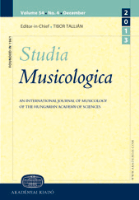
Studia Musicologica
Scope & Guideline
Navigating the Soundscapes of Diverse Musical Traditions
Introduction
Aims and Scopes
- Historical Musicology:
The journal extensively covers the historical development of music, focusing on composers, genres, and musical movements, particularly from the 19th and 20th centuries. - Analytical Studies:
Research published in this journal often includes detailed analyses of musical works, exploring compositional techniques, structures, and theoretical frameworks. - Cultural and Contextual Analysis:
There is a strong emphasis on understanding music within its cultural and social contexts, examining how historical events, societal changes, and artistic movements influence musical expression. - Interdisciplinary Approaches:
The journal encourages interdisciplinary research, connecting musicology with other fields such as literature, visual arts, and history, thereby enriching the understanding of music. - Focus on Prominent Composers:
Particular attention is given to significant composers, especially Hungarian figures like Béla Bartók and György Ligeti, reflecting the journal's regional heritage and its impact on broader music scholarship.
Trending and Emerging
- Reception History and Meta-Narratives:
There is a growing interest in the reception history of composers, particularly modernist figures like Ligeti, which suggests an expanding focus on how music is interpreted and contextualized over time. - Interdisciplinary Connections:
Research increasingly explores connections between music and other disciplines, including literature and visual arts, highlighting the importance of interdisciplinary approaches in understanding musical works. - Artistic Research:
The concept of artistic research is emerging, examining how creative practice can serve as a form of inquiry, thereby enhancing the understanding of music as both an art form and a research subject. - Focus on Contemporary Compositional Techniques:
An increasing number of studies are analyzing contemporary compositional techniques and their implications for modern music, indicating a trend towards exploring current musical practices and innovations. - Cultural Contextualization of Music:
There is a rising trend in examining music within broader cultural and societal contexts, emphasizing the importance of understanding music as a reflection of social dynamics and historical events.
Declining or Waning
- Traditional Music Forms:
There has been a noticeable reduction in studies focusing solely on traditional or folk music forms, indicating a shift towards more contemporary and experimental musical practices. - Performance Practice Studies:
While performance studies have been a staple of musicology, recent publications show a decline in this area, suggesting a transition to more theoretical and analytical frameworks rather than practical performance analysis. - Biographical Studies of Lesser-Known Composers:
Research on lesser-known composers has decreased, with a more concentrated focus on major historical figures, potentially limiting the exploration of diverse musical narratives. - Music and Technology:
The intersection of music and technology has been less frequently addressed, indicating a waning interest in contemporary issues such as digital music production and its implications for musicology.
Similar Journals

RIVISTA ITALIANA DI MUSICOLOGIA
Illuminating the Path of Musicological ResearchRIVISTA ITALIANA DI MUSICOLOGIA, published by the Italian Society of Musicology, is a distinguished journal dedicated to the field of musicology, offering a platform for scholarly research and discourse on a wide array of musical topics. With an ISSN of 0035-6867 and an E-ISSN of 2036-5586, this journal has contributed significantly to the understanding of music in cultural and historical contexts. Although the scope of coverage was marked from 2003 to 2008 in renowned databases like Scopus, the journal continues to serve as an invaluable resource for researchers, educators, and students embroiled in music studies. Its emphasis on rigorous research and critical analysis makes it a vital asset for anyone seeking to deepen their knowledge of musicological inquiry. While not an open-access publication, the RIVISTA ITALIANA DI MUSICOLOGIA remains a prestigious outlet for scholarly contributions that reach audiences eager to explore the complexities of musical heritage.
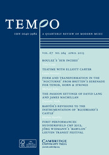
TEMPO
Navigating the Soundscape of MusicologyTEMPO, a renowned journal published by Cambridge University Press, is dedicated to the expansive field of music studies. With its rich history dating back to 1939, the journal has significantly evolved, offering researchers, professionals, and students a platform to explore diverse musical perspectives and innovations. Serving as a vital resource in its category, TEMPO is currently positioned in the Q2 quartile within the field of Music, reflecting its quality and academic influence. Although it operates under a traditional subscription model, its impactful contributions to music scholarship are underscored by its active engagement with contemporary issues in musicology, performance, and education. Researchers can rely on TEMPO for cutting-edge analyses, reviews, and critical discourse that shape the understanding of music in society.

Vestnik Sankt-Peterburgskogo Universiteta-Iskusstvovedenie
Illuminating Emerging Research in the ArtsVestnik Sankt-Peterburgskogo Universiteta-Iskusstvovedenie, published by ST PETERSBURG UNIV PRESS, is a distinguished academic journal based in the Russian Federation, focusing on the interconnected disciplines of Conservation, History, Music, and Visual Arts and Performing Arts. With an ISSN of 2221-3007 and E-ISSN of 2542-2243, this journal plays a vital role in disseminating scholarly research and fostering dialogue across these fields. Despite being categorized in the third quartile (Q3) in 2023 across its respective disciplines, its significance lies in publishing emerging research and critical analyses that contribute to the academic discourse. The journal accepts submissions until the converged years spanning 2016 to 2024, making it a relevant platform for current academic inquiry. Although it currently does not offer open access, the journal provides robust insights for researchers, professionals, and students eager to explore the nuances of cultural heritage and artistic expression. As it continues to develop its impact within the arts and humanities, Vestnik Sankt-Peterburgskogo Universiteta-Iskusstvovedenie remains an essential resource for those passionate about understanding and preserving the rich tapestry of artistic endeavors.

MUSIKFORSCHUNG
Unveiling Music's Cultural ImpactMUSIKFORSCHUNG is a distinguished journal in the field of music studies, published by NEUWERK-BUCH UND MUSIKALIENHANDLUNG in Germany. With its ISSN 0027-4801, the journal caters to scholars, practitioners, and students interested in the diverse realms of musicology. Although it is currently not an Open Access publication, MUSIKFORSCHUNG plays a vital role in the academic landscape by disseminating research and critical discourse on music from various historical and contemporary perspectives. The journal has established its worth in the academic community, being categorized in the Q4 quartile in Music for 2023 and holding a rank of #169 out of 180 in the Scopus Arts and Humanities Music category, placing it within the 6th percentile. With publication activities spanning from 2002 to 2013 and resuming in 2016 through to 2024, MUSIKFORSCHUNG continues to be a crucial resource for those dedicated to advancing music scholarship. Set in the cultural heart of Kassel, Germany, the journal invites contributions that foster an understanding of music's impact on society and culture.

Revista de Musicologia
Advancing the Discourse in Music StudiesRevista de Musicologia is a distinguished academic journal dedicated to the exploration and analysis of musicology, published by the SOC ESPANOLA MUSICOLOGIA. Based in Spain, this journal serves as a vital platform for music scholars, researchers, and enthusiasts to share innovative insights and original research concerning various aspects of music, including historical studies, ethnomusicology, and contemporary critiques. With its ISSN 0210-1459 and a current Scopus ranking placing it in the Q3 quartile of Music studies, the journal reflects a commitment to enhancing the discourse in this rich field. Although it currently does not publish under an open-access model, it continuously aims to provide a rigorous peer-reviewed environment for contributions that engage both academic inquiry and practical applications within musicology. The Revista de Musicologia is thus an essential resource for anyone in the field looking to expand their understanding and expertise in music studies from 2016 through 2024 and beyond.

Muzikoloski Zbornik
Connecting Scholars Through Musical InquiryMuzikoloski Zbornik is a prominent open-access journal in the field of musicology, published by the esteemed University of Ljubljana Press since 1965. Hailing from Slovenia, this journal has been dedicated to advancing the study of musical heritage, theory, and practice, serving as a vital platform for researchers, professionals, and students alike. With a notable Q2 category ranking in the field of music and a Scopus ranking of 109 out of 180 in Arts and Humanities, Muzikoloski Zbornik showcases high-quality research, fostering discourse and collaboration among scholars globally. The journal embraces a diverse range of topics, from ethnomusicology to music education, ensuring its relevance in an ever-evolving academic landscape. By providing unrestricted access to its content, it champions the dissemination of knowledge and supports the growth of the musicology discipline.

Problemy Muzykalnoi Nauki-Music Scholarship
Connecting Scholars Through the Art of MusicWelcome to Problemy Muzykalnoi Nauki-Music Scholarship, a leading journal in the field of music scholarship published by the esteemed Gnesin Russian Academy of Music. With an ISSN of 2782-358X and an E-ISSN of 2782-3598, this Open Access journal has been committed to the dissemination of high-quality research since 2009, making scholarly work accessible to a global audience. Covering diverse aspects of music theory, history, and its socio-cultural impacts, Problemy Muzykalnoi Nauki serves as an essential platform for scholars, educators, and practitioners in the arts and humanities, as well as in social sciences related to music education. While its Scopus coverage was discontinued in 2021, the journal remains influential, holding a rank of #48 in the Arts and Humanities category and a percentile of 67th, showcasing its relevance and rigor in the discipline. We invite researchers and students alike to explore the rich contributions made within these pages, fostering a deeper understanding and appreciation of music in contemporary society.
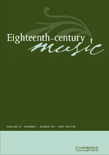
Eighteenth-Century Music
Engaging with the Rhythms of Cultural EvolutionEighteenth-Century Music, published by Cambridge University Press, serves as a pivotal platform for scholarly discussion surrounding music from the eighteenth century, ranging from musicology to cultural studies. With an ISSN of 1478-5706 and an E-ISSN of 1478-5714, this journal offers a unique lens into the musical landscape of the era, dissecting its myriad influences and contexts. Although it currently holds a Q4 ranking in the field of Music as per the 2023 category quartiles, its contributions are invaluable for researchers, professionals, and students eager to delve into historical music research. Operating from the United Kingdom, with an address at Edinburgh Bldg, Shaftesbury Rd, Cambridge, England, this journal invites submissions that engage with the long-standing traditions and transformative contexts of the period. By fostering an academic dialogue among its readership, Eighteenth-Century Music aims to illuminate the complexities and innovations within the realm of eighteenth-century music studies.
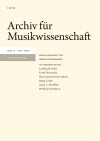
ARCHIV FUR MUSIKWISSENSCHAFT
Celebrating the Art and Science of Music ResearchARCHIV FUR MUSIKWISSENSCHAFT, the esteemed journal published by FRANZ STEINER VERLAG GMBH, serves as a significant platform for the dissemination of scholarly research in the field of musicology. With an ISSN of 0003-9292 and an established history of publication reaching back to 2002, this journal aims to explore various aspects of music theory, history, and ethnomusicology, contributing to academic discourse within a vibrant global community. Despite its designation in the Q4 category for music in 2023, the journal continues to foster innovative research and discussions among budding musicians, established academics, and music enthusiasts alike. While Open Access options are not currently available, the journal's offerings are enriched by a thorough review process aimed at maintaining high academic standards. Located in Stuttgart, Germany, at BIRKENWALDSTRASSE 44, D-70191, ARCHIV FUR MUSIKWISSENSCHAFT is committed to engaging its readers through insightful articles and reveals the evolving landscape of music scholarship while remaining a resourceful tool for researchers and students pursuing knowledge in this captivating field.
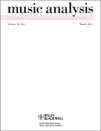
MUSIC ANALYSIS
Charting New Territories in Music AnalysisMUSIC ANALYSIS, published by WILEY, is a prestigious journal in the field of musicology, recognized for its critical contributions to the analysis of music and its myriad influences on culture and society. With an ISSN of 0262-5245 and an E-ISSN of 1468-2249, this journal has established itself as a vital resource for researchers, professionals, and students alike, boasting a Q1 ranking in the 2023 category of Music. As part of a highly competitive field, it ranks 70th out of 180 in the Arts and Humanities Music category on Scopus, positioning it within the 61st percentile. MUSIC ANALYSIS serves as an essential platform for innovative research and insightful discourse, engaging with musical theory, practice, and education from 1996 to 2024. Its commitment to fostering rigorous scholarship makes it indispensable for those seeking to deepen their understanding of music and its analytical frameworks. Although it does not offer Open Access options, its relevance and impact in the genre ensure accessibility through institutional subscriptions and university libraries.